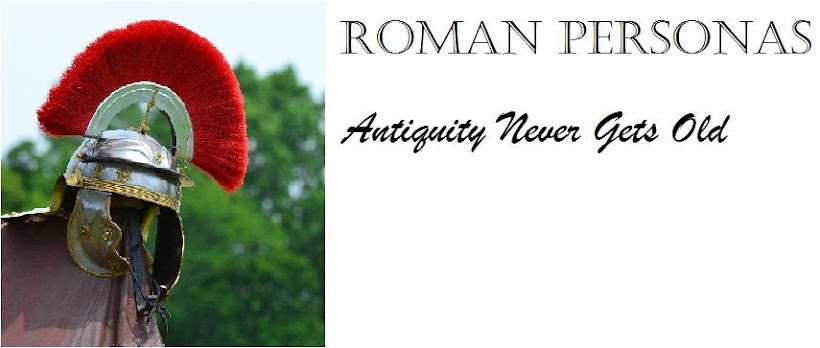The other day our Latin III class was reading Catullus 45, and one of the students commented on the heavy alliteration in Acme's words to Septimius. Suddenly, Marilyn Monroe's breathy, seductive "Happy Birthday, Mr. President," sung to President John F. Kennedy. I quickly found a clip of this on YouTube and showed it to the class to illustrate how I took this passage. On a whim, I posted this to the Latinteach email list. The next day, I received an email from Jessica Lahey, a teacher and author from New Hampshire. A bit of back-and-forth between us via email led to her publishing a delightful piece on one of her blogs.
There will always be connections between the Classical world and modern pop culture for the simple reason that the literature and arts of the ancient Greeks and Romans gave expression to the deepest, universal aspects of human life. It is for this reason that the study of Latin and Greek falls under the humanities. It is why the study of and engagement with these languages and their cultures is an essential part of living a rich life, one that can look with eager anticipation to the future because of its firm foundation in the past.
Friday, February 24, 2012
Friday, February 10, 2012
The Sword Is Mightier Than the Pen
There is nothing like teaching Caesar's De Bello Gallico to Latin II with authentic Roman weaponry! Now that I have the two mannequins decked out in Roman armor standing in opposite corners of the classroom, this year's teaching of Caesar went to a whole new level. Students got to handle everything yesterday as we explored the structure of the army anyhow a soldier was equipped. Today we did a little re-enactment in the middle of the room.
The first passage we read today was about the early part of the battle of Bibracte.
Milites loco superiore pilis missis facile hostium phalangem perfregerunt. Ea disiecta gladiis destrictis in eos impetum fecerunt. Gallis magno ad pugnam erat impedimento quod pluribus eorum scutis uno ictu pilorum transfixis et conligatis, cum ferrum se inflexisset, neque evellere neque sinistra impedita satis commode pugnare poterant, multi ut diu iactato bracchio praeoptarent scutum manu emittere et nudo corpore pugnare. (BG I.25)*
I asked for a couple of student volunteers to stand one in front of the other, each holding one of our shields in imitation of the Helvetians. I brought one of the spears toward them and demonstrated how it could have transfixed the shields and pinned them together. The students quickly saw the disadvantage and realized the only choice the Helvetians had was to drop their shields.
Then we read this from I.26.
Ad multam noctem etiam ad impedimenta pugnatum est, propterea quod pro vallo carros obiecerunt et e loco superiore in nostros venientes tela coniciebant et non nulli inter carros rotasque mataras ac tragulas subiciebant nostrosque vulnerabant.*
I have always illustrated this by having the students pile up their desks in the middle of the room in imitation of the Helvetians wagons. In the past, we enacted what went on using a yardstick and a golf club I keep in the room (don't ask!). This year we recreated the last stand of the Helvetians using our two real spears.
I'm not sure who had more fun, but I am sure that we all got a better sense of Caesar's writings through roleplaying and the use of authentic weaponry.
*For translations of these passages, see here.
The first passage we read today was about the early part of the battle of Bibracte.
Milites loco superiore pilis missis facile hostium phalangem perfregerunt. Ea disiecta gladiis destrictis in eos impetum fecerunt. Gallis magno ad pugnam erat impedimento quod pluribus eorum scutis uno ictu pilorum transfixis et conligatis, cum ferrum se inflexisset, neque evellere neque sinistra impedita satis commode pugnare poterant, multi ut diu iactato bracchio praeoptarent scutum manu emittere et nudo corpore pugnare. (BG I.25)*
I asked for a couple of student volunteers to stand one in front of the other, each holding one of our shields in imitation of the Helvetians. I brought one of the spears toward them and demonstrated how it could have transfixed the shields and pinned them together. The students quickly saw the disadvantage and realized the only choice the Helvetians had was to drop their shields.
Then we read this from I.26.
Ad multam noctem etiam ad impedimenta pugnatum est, propterea quod pro vallo carros obiecerunt et e loco superiore in nostros venientes tela coniciebant et non nulli inter carros rotasque mataras ac tragulas subiciebant nostrosque vulnerabant.*
I have always illustrated this by having the students pile up their desks in the middle of the room in imitation of the Helvetians wagons. In the past, we enacted what went on using a yardstick and a golf club I keep in the room (don't ask!). This year we recreated the last stand of the Helvetians using our two real spears.
I'm not sure who had more fun, but I am sure that we all got a better sense of Caesar's writings through roleplaying and the use of authentic weaponry.
*For translations of these passages, see here.
Subscribe to:
Posts (Atom)
